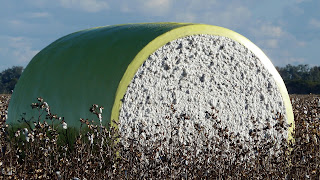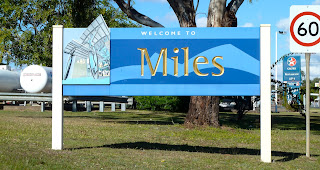Is there anything beats the anticipation at the outset of a long day's drive at the start of a serious road trip?
click on pix to see them big
Our first pit stop is at Oakey, for fruit salad, cold toast and hot coffee. Trip themes gradually emerge over time, but here is a big clue to one of them...
Back on the road – I wonder how many times I'll write that in the next few weeks – coal was making its presence felt by the Western Line Railway. Still no covers on the coal wagons, then?
By now the plains of the Darling Downs are so flat they are miraging.
And then we're in cotton country, around Dalby. Much of the crop has been harvested, but I am on a photographic mission to find bolls still on the stem and stacks of striking yellow bales.
Dalby is 210 km from Brisbane. I have never seen so many pieces of machinery – tractors, ploughs, backhoes, cultivators, harvesters, balers, excavators, rockbreakers, scrapers, loaders, dumpers, graders, you name it. My friend simply says: 'Don't like this. One frickin' big plant park'. On Myall Creek, a tributary of the Condamine River, Dalby is the administrative hub of the Western Downs as well as supporting a highly productive agricultural region and servicing an ever-growing resources sector. Cattle, cotton and coal. Signposts along the Warrego are all too familiar: Tara, Acland, Cecil Plains. Offices of the energy companies are in all the big towns, along with commercial property agencies, huge new industrial sheds 'with highway frontage', warehouses and workshops. This is a more pleasant view.
Chinchilla is about 300 km from Brisbane and has a much nicer feel to it, starting with its welcome sign. Here we see our first road train, another theme-to-be.Not surprisingly, I didn't know the Melon Festival was so renowned. I didn't know there was a melon festival. Chinchilla produces a quarter of Australian melons (including watermelon, rockmelon and honeydew) and the festival began in 1994 to raise the spirits of producers devastated by drought. Its popularity has increased, and now there is melon skiing, melon bungee, melon bullseye, melon ironman, a pip spitting competition and melon head smashing – cracking open watermelons using only the head. The record currently stands at 47 in a minute. Crazy Chinchillians.
There is Miles more agriculture and mining development in the Western Downs. And big numbers still to do. Miles is on Dogwood Creek and was thus named in 1844 by my old mate Ludwig Leichhardt, but then renamed after a Queensland Colonial Secretary, William Miles. The early colonists went in for honouring bigwigs. More nice name signs and big silos follow.
I'd expected Roma, 515 km west of Brisbane, to be bigger than most of the main towns along the highway. I know it has an expanding fly-in fly-out population, and there is evidence of workers' camps, storage yards for heavy machinery, signs to rigs and so on. What I wasn't prepared for was the huge number of Queensland Bottle Trees. They're everywhere, hundreds of them, in the main drag, lining side streets. Remarkable.
We stop for a picnic lunch on the other side. From now on the vegetation is sparser, the road emptier and the towns smaller. The railway is still with us.
Advice for Outback drivers includes a warning to watch out for kangaroos active at dawn and dusk. We've seen several dead by the roadside for the past few hours, but onward from Mitchell – 587 km west of Brisbane and 176 east of Charleville – it's carnage. Unfortunately this is something we're going to have to get used to. We come across our first live one standing in the road at 3.45 pm, 28 km from Charleville. So much for dusk. We cut our speed, even though progress has been hampered by extensive roadworks. They add at least an hour, if not more, to our journey time today and we'd quite like to get there now.
But then, big excitement. My friend spots our first echidna in the wild, on the verge. As we screech to a halt and turn around, he's crossing the road painfully slowly: the image below is blurred not by his speed but my excitement. I anxiously watch the road for trucks. Do you think they'd stop if I stood in the middle flagging them down? Our spiny friend makes it but he's aware of us now; he stops and hunkers down. We have to take his picture quickly before leaving him alone so he'll head for the undergrowth and safety.
And, a few minutes later, a Major Mitchell's Cockatoo, unfortunately with no photograph to prove it. I spot it high in a tree by the roadside with another bird I can't identify as we pass. Major Mitchells are restricted to arid and semi-arid areas and their range is contracting as a result of their favourite woodland habitats being fragmented by land clearance. Later, we are assured we'll see more of these distinctive birds.
Finally, a welcome sign. I can't help looking back for a moment, however. We head straight for our accommodation.
A few years ago, I typed 'the best place in Australia to view the night sky' into Google. Charleville was the answer. In 2010 we had a weekend booked – what a helluva drive there and back in a weekend – but had to cancel because of a cloudy forecast. At last, tonight, we're booked in at the Cosmos Centre at 7.30. Cloud has been building since later afternoon, but I know it can often clear by evening. We head to the Cattle Camp Hotel for a delicious steak (but too few chips) and a Barossa Cab Sav. We've just ordered when I get the call: tonight's viewing of the heavens has been cancelled. I rebook for tomorrow night, after the Bilbies! When we leave the pub at about 7.45, large areas of the sky are clear and many stars are blinking at us. I can see the Milky Way from the middle of town there is so little light pollution. Tomorrow is another night.








































No comments:
Post a Comment